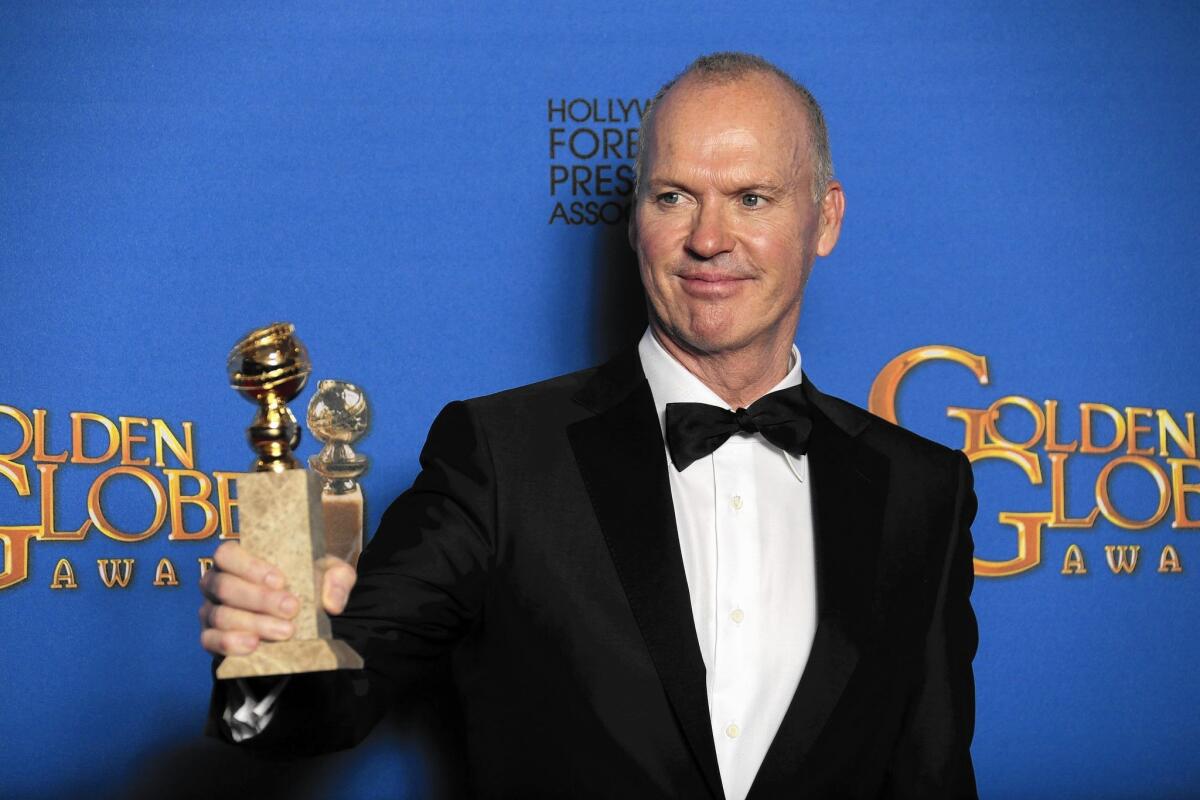Golden Globes 2015: Sweet wins for audacious filmaking

“Unapologetic.”
Michael Keaton invoked the idea as he accepted the Golden Globe for playing a fading movie actor trying to rise like a phoenix on Broadway. He was referring to his all-too-human character in “Birdman,” directed by Alejandro G. Iñárritu, another Globe winner.
“Audacious” would have worked as well, for “Birdman” and more. Because one by one, as the winners walked up, they represented a class of filmmakers and actors whose independence often puts them at the industry’s edges, refusing to march to the box-office drumbeat that cripples the creative spirit.
It’s why “Boyhood’s” three wins are so sweet. Within the studio system it would never have survived. Outside it, it has thrived. Writer-director Richard Linklater’s 12-year filmmaking experiment captures, like lightning in a bottle, a young boy growing up, a single mother struggling to stay afloat, a distant father trying to connect. A naturalistic story of Americana that won best drama and director for Linklater and supporting actress for Patricia Arquette as that single mom.
Arquette’s acceptance, one of the night’s most poignant, spoke of family and mothers and children — so many other things besides acting that life itself began to take center stage.
PHOTOS: Red Carpet | Show highlights | Fashion | Quotes | Top nominees | Best and worst moments |Miss Golden Globes
“Grand Budapest Hotel,” which won for movie comedy, almost defies categorization. Wes Anderson took an incredibly eclectic cut at an in-between place and time — Great War just over, storm clouds building on the horizon for an even greater and more devastating conflict — and found a way to be irreverent, insightful and visually stunning. Idiosyncrasy of this sort is easy for audiences to miss. Awards like Sunday’s help.
J.K. Simmons in an even smaller movie, unconventional in its look at artistic genius, picked up the supporting actor film award for his searingly maniacal music professor in “Whiplash” — brilliant, demanding and definitely unapologetic.
“Uncomfortable” too was Simmons’ ego-destroying screaming. But also not easy to watch was actress in a drama winner Julianne Moore, who disappeared into the confusion and disconnection of Alzheimer’s.
Or Eddie Redmayne, also winning for drama, mirroring the profound difficulties of the neuromuscular disease that attacked theoretical physicist Stephen Hawking in “The Theory of Everything,” breaking everything but his mind and will.
“Resistance” could be found all night long. It was perhaps most sharply drawn in “Selma,” the civil rights drama, which won a Globe for original song, “Glory.” The award was presented by the original Prince and went to the two originals who collaborated on it — Common and John Legend.
Amy Adams’ win for “Big Eyes” reflected a quieter pushback. Margaret Keane’s pop culture portraits, dominated by soul-eyed waifs, were essentially stolen by a husband taking credit for her work. She finds her voice in a court of last resort, demanding to be heard. Though I’m not sure how Tim Burton’s film tracing the incredible repression and ultimate resistance of the artist ended up in the comedy category.
In Adams’ tearful speech, one of many during the night, she spoke of Keane but also of the women in the room on this night, the actresses who refuse to be silenced, and her daughter at home who, like little girls everywhere, listen and learn.
GOLDEN GLOBES 2015: Full coverage | Top nominees | Complete list | Ballot | Live updates | Red carpet photos | Show highlights
“Leviathan,” the foreign language winner, was its own little pièce de résistance. In this case, it is the story of a minor revolution in a small Russian village and a man who refuses to bow to a corrupt political system.
Even the animation winner, “How to Train Your Dragon 2,” was a children’s fable about tolerance and accepting differences.
In one movie after another, in one speech after another, in television as well, we heard voices — unapologetic, audacious, resistant, rising.
And everywhere the lines were blurred.
“Transparent,” Jill Soloway’s groundbreaking comedy series on the transgender world won in a television category, though its home base is Internet-giant Amazon. Jeffrey Tambor, “Transparent’s” star, won as comedy TV actor for playing a transgender woman.
Kevin Spacey was another of the night’s winners for his calculating politician in “House of Cards.” TV drama was the category, but “Cards” is a creature born of Netflix, a streaming media service; the show just as likely seen on a computer, iPad or cellphone as TV.
The shift in focus felt fundamental somehow. George Clooney, that suave Hollywood superstar, in accepting the Cecil B. DeMille lifetime achievement award, barely talked about himself, or his career.
The heartthrob turned writer-director-activist saved the warmest, most reverential words for his new wife, human rights attorney Amal Alamuddin.
If anything, Clooney seemed to be dimming the normal high-wattage of his presence, self-deprecating to a fault. Almost apologetic.
Indeed it was a night for the outsiders, the provocateurs, the out-of-the-box thinkers. The unconventional took home the prizes. Movies, TV, the streaming Internet barbarians at the gate unsettled as well as entertained. Moving images, moving stories, most far from the mainstream.
For a complete list of winners at the Golden Globes on Sunday night look beyond any borders, past any barriers. Look in the mirror. Unapologetic, audacious, resistant, eclectic, exceptional. With entertainment like that in the spotlight, we all took home the gold.
More to Read
Only good movies
Get the Indie Focus newsletter, Mark Olsen's weekly guide to the world of cinema.
You may occasionally receive promotional content from the Los Angeles Times.











